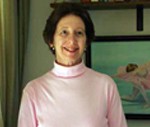Burned Alive: a Victim of the Law of Men by Souad, in collaboration with Marie-Therese Cuny, Warner Books, 2003
By Sheila Orysiek

SAN DIEGO — The author’s name is not “Souad” and her address “lives in Europe” is purposely generalized. The people who tried to kill her once would try again if they could.
Souad spent the first eighteen years of her life in a rural Arab village on the West Bank in the area disputed by Israel and Palestine. She had never traveled farther than a small market town near her home. When not laboring in the fields, she, her mother and sisters were locked behind an iron door, forbidden to leave the family compound. Souad knew nothing of the wider world such as America, Europe, or that she lived on a planet.
She had never had shoes, was completely illiterate, never watched television, listened to a radio or used a telephone. The family telephone was only for the use of the men – her father and brother. One day the brother thought one of his sisters was standing too close to the telephone and thus there existed the possibility that she could “telephone men.” To save the family’s “honor” he strangled her with the cord. The village considered the brother a hero for this act. The child’s name was never mentioned again and she disappeared from the family’s memory.
Souad did not know how to read a clock or wristwatch; only the men used such things.
Her mother stated that she had given birth to fourteen children, but Souad counted only three sisters and a brother. One day as she watched her mother smother a new born female infant, she realized what had happened to all the missing siblings. Girls were a curse and useless trash.
The father was a successful farmer. However, the women did all of the hard labor; carrying heavy buckets of water, planting, fertilizing and harvesting, tending the flocks, cooking, cleaning house and stables. They served the men in every capacity including bathing their feet. Not allowed to speak unless spoken to they also were not permitted to raise their eyes from the ground. The sisters, as well as the mother, were tied up and brutally whipped with a heavy belt by both father and brother. There didn’t have to be a “reason” other than whim. The women were completely enslaved.
The author explains that this behavior was a deeply embedded cultural norm – no one questioned it. The only event that could give a woman any status at all was to get married and give birth to a boy. In that desperate hope, Souad made contact with a male neighbor who had spoken to her father about marrying her. The man told her he would once again talk to her father about marriage if she acquiesced to his demand for sex. He gave her mere seconds to decide. When she became pregnant – he abandoned her. Now the family’s honor was at stake and only her death could repair it. Her brother-in-law happily volunteered to murder her.
A woman identified as “Jacqueline” enters a darkened dirty room in a hospital on the West Bank. Two young women are lying on stretchers horribly burned and obviously left in the room to die. One of them does – but the other continues to breathe. Occasionally, a nurse comes in to roughly tear away – without any pain medication – the fibers of clothing which are now deeply embedded into third degree burns. The victim’s chin has melted into her chest and is immoveable. Her family has tried to get into the room to complete the task of murdering her. In the midst of this hell, she has given birth to an infant – which a nurse took away.
Jacqueline represents a charity, (www.surgir.ch) based in Switzerland* dedicated to rescuing women and children from the murderous violence prevalent in so many countries of the East and now spreading into Europe and the Americas. Rescuing these women is a very dangerous and delicate task as it challenges the deeply embedded concept of male “honor” based on female “purity.” Jacqueline, putting her own life at risk, convinces Souad’s parents to travel to Jerusalem to sign papers giving up their parental rights. Jacqueline then gathers all the other documents necessary to move a semi-conscious burn victim, stinking with rotted flesh and gasoline, into Israel and onto a plane in Tel Aviv bound for Switzerland. She even manages to find and rescue the now two month old infant.
Souad’s lengthy recovery, leaving her badly scarred, is only the beginning of a fight to rise from the ashes of her previous existence to life in modern Europe. She has much to learn and much to unlearn. Her parents had taught her that if she looked at a Jew she would turn into a pig. But, she comes to realize that Jews and Israel are not her enemy. She also has to learn that she now has the ability to make choices about her life and to choose wisely.
This is a powerful book. It is not fiction. It is a biography. And, that’s the real horror.
* Foundation subject to Swiss law with special consultative status to the United Nations Economic and Social Council (ECOSOC) in New York, Geneva and Vienna, since 2005. Active in the UN, the foundation has been a member of the UN Conference of NGOs (CoNGO) since 2008. The chairperson and founder, Jacqueline Thibault, was knighted in the French Government’s National Order of the Legion of Honour in December 2010.
*
Orysiek is a freelance writer who specializes in the arts and literature. She may be contacted via sheila.orysiek@sdjewishworld.com. Comments intended for publication in the space below must be accompanied by the letter writer’s first and last name and by his/ her city and state of residence (city and country for those outside the U.S.)